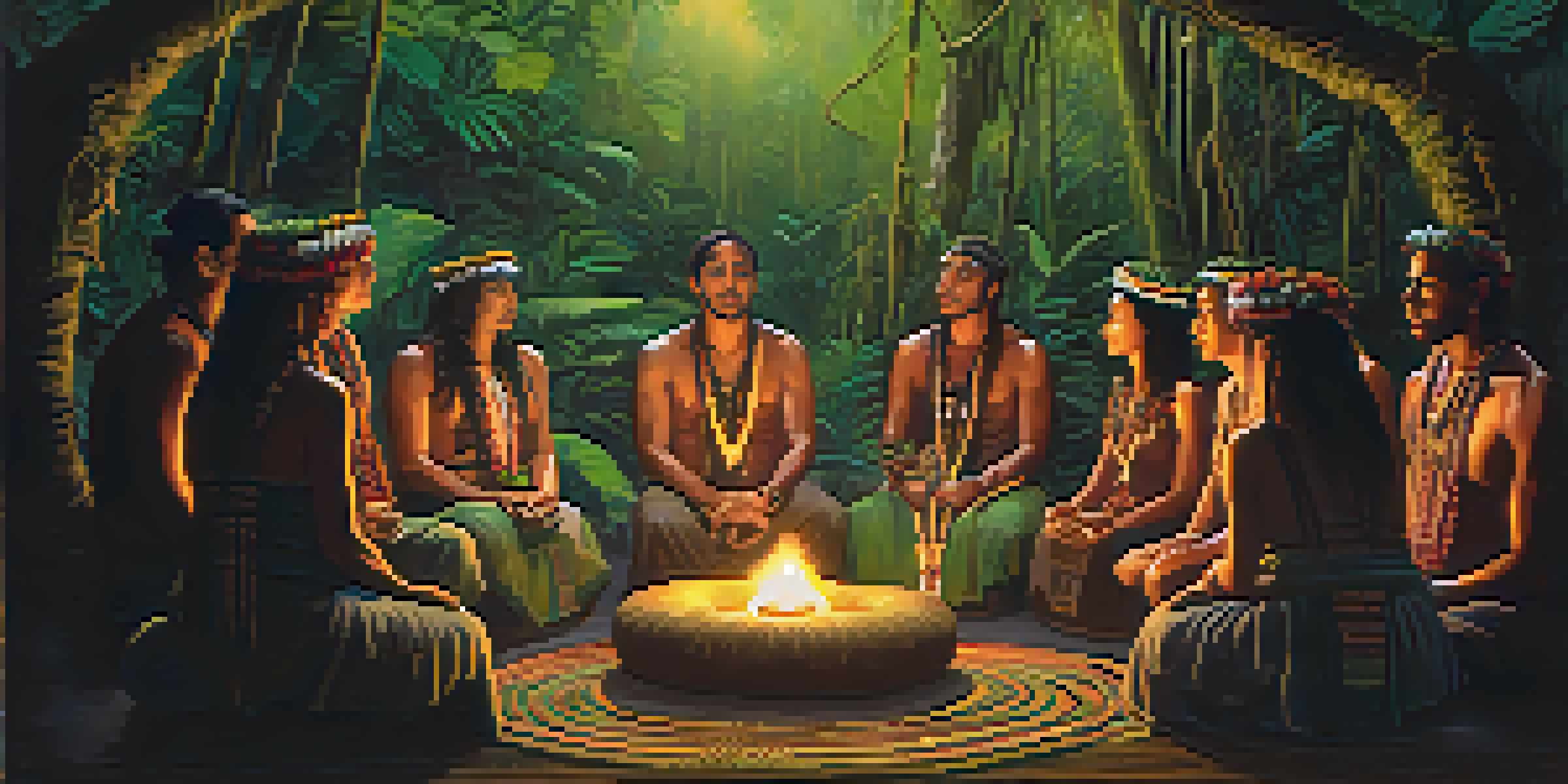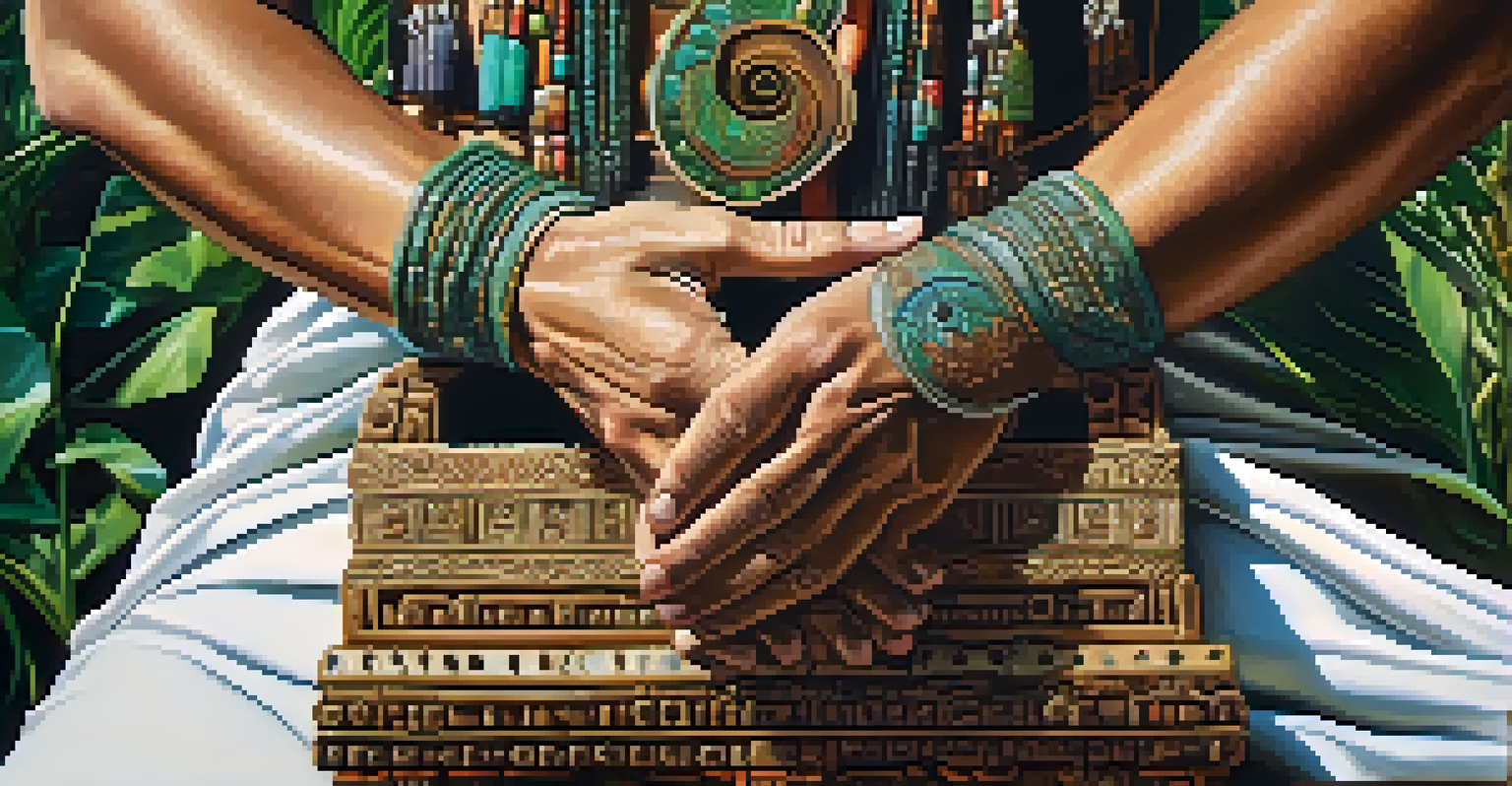The Role of Icaros: Sacred Songs in Ayahuasca Rituals

Understanding Icaros: The Essence of Sacred Songs
Icaros are not just songs; they are a vital component of Ayahuasca rituals, serving as sacred melodies that guide participants through their experiences. Rooted in Amazonian indigenous cultures, these songs are believed to carry the wisdom of ancestors and spirits. Each Icaro is unique, created to evoke emotional responses, facilitate healing, and connect individuals with the spiritual realm.
Music is the shorthand of emotion.
In Ayahuasca ceremonies, the shaman or curandero uses Icaros to create a safe and supportive atmosphere. The songs often reflect the energies present in the room, helping to navigate the sometimes intense experiences that Ayahuasca can bring. This connection between the singer and the participants amplifies the ritual's overall impact, allowing for deep personal insights and transformations.
Moreover, Icaros can vary widely in style, tone, and purpose, reflecting the personal experiences and teachings of the shaman. Some Icaros are gentle and soothing, while others can be powerful and invigorating. This diversity ensures that each ceremony is a unique journey, tailored to the needs of the participants.
The Shaman's Role in Singing Icaros
The shaman plays a crucial role in the Ayahuasca ceremony, not only as a guide but also as a performer of Icaros. Their ability to sing these sacred songs is deeply intertwined with their training and spiritual journey, which often spans many years. A shaman's connection to the Icaros can significantly influence the ceremony, providing direction and support to those undergoing their Ayahuasca experience.

As the shaman sings, the Icaros serve to invoke spirits and facilitate communication with the unseen world. The melodies can help participants access different emotional states, providing comfort during challenging moments or enhancing feelings of joy and connection. This dynamic interaction between the shaman and participants creates a profound sense of community and shared experience.
Icaros Guide Ayahuasca Experiences
Icaros serve as sacred songs that guide participants through their Ayahuasca journeys, facilitating emotional responses and spiritual connections.
Additionally, the act of singing is seen as a form of healing in itself. The vibrations and sounds of the Icaros resonate within the participants, promoting energetic shifts that can lead to emotional release and clarity. Thus, the shaman's singing becomes a therapeutic tool, harnessing the power of sound to aid in the healing process.
The Healing Power of Icaros in Ayahuasca Ceremonies
Icaros are often regarded as a healing mechanism within Ayahuasca rituals. The melodies and lyrics are crafted to resonate with specific ailments, emotional struggles, or spiritual blockages that participants may face. By singing these songs, the shaman helps to unlock pathways to healing, allowing individuals to confront and release their burdens.
The sacred is in the everyday, if we can just recognize it.
Participants often report feeling a deep sense of connection with the Icaros, experiencing them as a form of support during their journey. For many, the songs provide a familiar anchor amidst the chaos of the Ayahuasca experience, guiding them back to a place of safety and comfort. This connection can foster a sense of trust in the process, making it easier to dive into the depths of their psyche.
Moreover, the healing power of Icaros extends beyond the ceremony itself. Many individuals carry the essence of the songs with them long after the experience, integrating the lessons learned into their daily lives. This lasting impact underscores the importance of Icaros in the transformative journey that Ayahuasca facilitates.
Cultural Significance of Icaros in Indigenous Traditions
The origins of Icaros can be traced back to the rich cultural tapestry of Amazonian indigenous peoples. These songs are steeped in tradition and spirituality, often passed down through generations. They embody the collective wisdom and experiences of the community, reinforcing cultural identity and continuity.
In many indigenous cultures, Icaros serve as a bridge between the physical and spiritual worlds. They are not just musical expressions; they are powerful tools for communication with ancestors and spirits. This deep-rooted connection highlights the respect and reverence these communities hold for their traditions and the natural world.
Shamans Enhance Healing with Icaros
The shaman's singing of Icaros is crucial, as it helps invoke spirits and creates a supportive atmosphere for healing during ceremonies.
Furthermore, Icaros play a significant role in ceremonies beyond Ayahuasca. They can be utilized in various healing practices, celebrations, and rites of passage. This versatility showcases the integral role that Icaros play in the spiritual and cultural life of indigenous peoples, ensuring their traditions remain vibrant and alive.
The Impact of Icaros on Individual Experiences
Each participant's experience with Icaros during an Ayahuasca ceremony is deeply personal and unique. Many individuals report experiencing profound emotional releases triggered by specific melodies or lyrics, leading to moments of clarity and understanding. This personal connection to the songs can be a catalyst for significant shifts in perspective and emotional healing.
The emotional resonance of Icaros often allows participants to access memories or feelings that may have been buried or ignored. As the songs weave through the ceremony, they can evoke a sense of nostalgia, joy, or even sadness, facilitating a cathartic release. This process can be transformative, helping individuals to confront and process their emotions in a safe environment.
Additionally, the impact of Icaros can continue to unfold long after the ceremony ends. Participants may find themselves recalling specific songs during challenging times, using them as a source of strength or guidance. This lasting influence highlights the power of Icaros to shape not just the moment of the ceremony but also the ongoing journey of healing and self-discovery.
Icaros and the Modern Ayahuasca Movement
As the modern Ayahuasca movement continues to grow, the role of Icaros is gaining increased recognition and appreciation. With more individuals seeking authentic experiences, shamans are often called upon to share their knowledge of Icaros and their significance. This revival is helping to bridge the gap between traditional practices and contemporary seekers.
In many contemporary ceremonies, the emphasis on Icaros has become a focal point for participants. People are increasingly aware that these songs are not just background music; they are essential to the healing process. This understanding enhances the overall experience, allowing individuals to engage more deeply with the ritual.
Cultural Roots of Icaros Matter
Icaros are deeply embedded in Amazonian indigenous cultures, acting as a bridge between the physical and spiritual worlds while preserving community traditions.
However, this rise in popularity also raises questions about cultural appropriation and respect for indigenous traditions. It's crucial for modern practitioners to approach Icaros with reverence, honoring their origins and the communities that have nurtured them for generations. By fostering a respectful relationship with these sacred songs, we can ensure their continued significance in both traditional and modern contexts.
Conclusion: The Enduring Legacy of Icaros
The legacy of Icaros in Ayahuasca rituals is profound and enduring, serving as a testament to the power of music and spirituality in the healing process. These sacred songs not only enhance the experience of participants but also foster a deep connection to cultural traditions and spiritual wisdom. As we continue to explore the role of Icaros, we uncover layers of meaning that enrich our understanding of both Ayahuasca and the cultures that embrace it.
In a world where many are seeking healing and connection, the resonance of Icaros offers a pathway to personal transformation and communal bonding. The melodies and messages embedded in these songs can guide individuals through their journeys, helping them to navigate the complexities of their emotions and experiences. This enduring legacy reminds us of the importance of honoring our past while embracing the possibilities of the future.

Ultimately, Icaros embody a sacred space where music, spirituality, and healing converge. Whether in the heart of the Amazon or in modern ceremonies around the world, these songs will continue to play a vital role in the transformative power of Ayahuasca rituals, inviting all to partake in the rich tapestry of human experience.